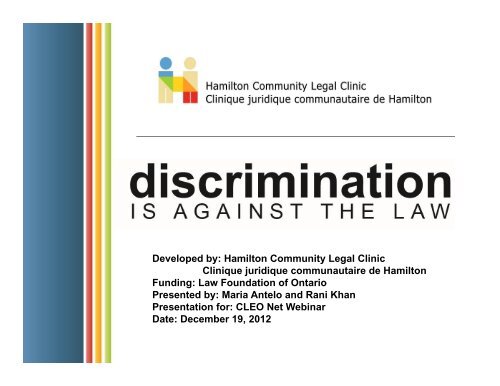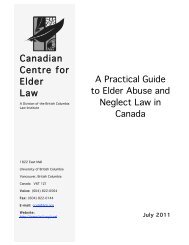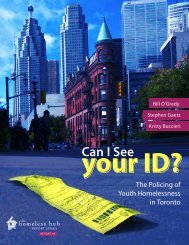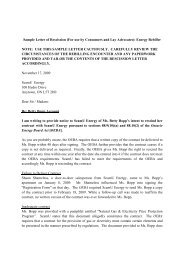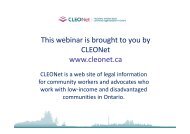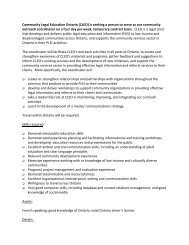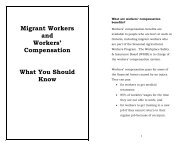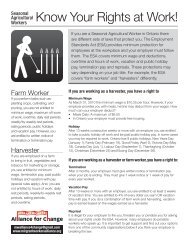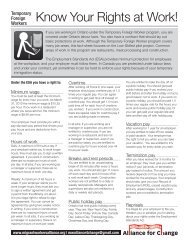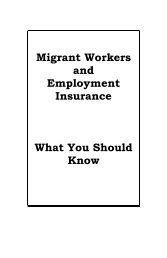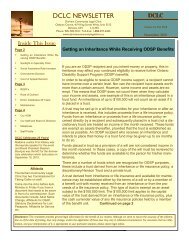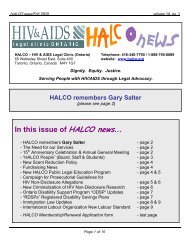What is discrimination? - Your Legal Rights
What is discrimination? - Your Legal Rights
What is discrimination? - Your Legal Rights
You also want an ePaper? Increase the reach of your titles
YUMPU automatically turns print PDFs into web optimized ePapers that Google loves.
Developed by: Hamilton Community <strong>Legal</strong> Clinic<br />
Clinique juridique communautaire de Hamilton<br />
Funding: Law Foundation of Ontario<br />
Presented by: Maria Antelo and Rani Khan<br />
Presentation for: CLEO Net Webinar<br />
Date: December 19, 2012
“All human beings are born free<br />
and equal in dignity and rights”<br />
Universal Declaration of Human <strong>Rights</strong><br />
United Nations 1948
Agenda<br />
1. Ontario Human <strong>Rights</strong> Code (OHRC)<br />
2. <strong>What</strong> <strong>is</strong> d<strong>is</strong>crimination<br />
• Social areas<br />
• Grounds<br />
3. Exceptions to the Code<br />
4. Ontario Human <strong>Rights</strong> System<br />
5. Human <strong>Rights</strong> Application<br />
• How to file an application<br />
6. Remedies<br />
7. Where to get help
Pre-Quiz: True of false<br />
1. As a refugee I’m not protected under<br />
the Code.<br />
2. I can’t live in adult-only apartments<br />
because of my children.<br />
3. I am 64, so it’s alright for the<br />
manager to keep asking me when I’m<br />
going to retire.
Pre-Quiz: True of false<br />
4. At the library, a man sitting near me<br />
says he doesn’t like blacks and that I<br />
should move away. If I tell the<br />
librarian she can tell him to stop.<br />
5. A landlord can refuse to show me<br />
and my boyfriend the apartment<br />
because we are a gay couple.
Ontario’s Human<br />
<strong>Rights</strong> Code
Ontario's Human <strong>Rights</strong> Code<br />
The Code protects people in Ontario<br />
against d<strong>is</strong>crimination.<br />
- Foundations of the Code<br />
- Where the Code came from<br />
- Preamble
<strong>What</strong> <strong>is</strong> d<strong>is</strong>crimination
<strong>What</strong> <strong>is</strong> d<strong>is</strong>crimination<br />
D<strong>is</strong>crimination <strong>is</strong>:<br />
• treating somebody unfairly or differently<br />
• Denying someone a benefit<br />
• Excluding someone<br />
• Imposing special obligations on someone<br />
Because of a character<strong>is</strong>tic like their race,<br />
d<strong>is</strong>ability, sex, age or religion, etc. (called a<br />
prohibited ground)
<strong>What</strong> <strong>is</strong> d<strong>is</strong>crimination<br />
D<strong>is</strong>crimination<br />
- can target one person;<br />
- can target a group;<br />
- can be hard to see or it can<br />
be part of a system.
<strong>What</strong> <strong>is</strong> d<strong>is</strong>crimination<br />
There are different forms of d<strong>is</strong>crimination:<br />
1. Direct d<strong>is</strong>crimination<br />
2. Indirect d<strong>is</strong>crimination<br />
3. Systemic d<strong>is</strong>crimination<br />
4. Po<strong>is</strong>oned environment<br />
5. Harassment<br />
6. Racial profiling<br />
7. Repr<strong>is</strong>al or threat of repr<strong>is</strong>al
<strong>What</strong> <strong>is</strong> d<strong>is</strong>crimination<br />
<strong>What</strong> kind of d<strong>is</strong>crimination <strong>is</strong> th<strong>is</strong><br />
Curt<strong>is</strong> <strong>is</strong> 17 years old and <strong>is</strong> trying to find an<br />
apartment. He <strong>is</strong> on social ass<strong>is</strong>tance. The<br />
landlord asks him to fill out an application.<br />
After a couple of days Curt<strong>is</strong> calls the landlord<br />
to see if he got the apartment. The landlord<br />
says “Sorry. It’s only for working people. ”
<strong>What</strong> <strong>is</strong> d<strong>is</strong>crimination<br />
<strong>What</strong> form of d<strong>is</strong>crimination <strong>is</strong> th<strong>is</strong>:<br />
An organization hires people from all walks<br />
of life; and yet it seems that all the<br />
managers are older white men.
<strong>What</strong> <strong>is</strong> d<strong>is</strong>crimination<br />
Harassment:<br />
Comments or Conduct that are<br />
unwelcome to you
Questions
<strong>What</strong> <strong>is</strong> d<strong>is</strong>crimination<br />
Social Areas – where <strong>is</strong><br />
d<strong>is</strong>crimination prohibited<br />
Ontarians enjoy freedom from<br />
d<strong>is</strong>crimination in 5 areas, called<br />
'social areas‘:<br />
• employment<br />
• accommodation<br />
• services<br />
• goods & facilities<br />
• membership in vocational<br />
associations & trade unions
<strong>What</strong> <strong>is</strong> d<strong>is</strong>crimination<br />
Prohibited Grounds of D<strong>is</strong>crimination<br />
PART 1 of the Code l<strong>is</strong>ts the grounds of d<strong>is</strong>crimination — you<br />
cannot td<strong>is</strong>criminate i i against another person or group of people<br />
because of their:<br />
• Sexual orientation •Colour<br />
• Family status<br />
• Marital status<br />
• Age<br />
• Receipt of public<br />
ass<strong>is</strong>tance<br />
(Note: Th<strong>is</strong> ground<br />
applies only to claims<br />
about housing.)<br />
• Record of offences<br />
(Note: Th<strong>is</strong> ground<br />
applies only to claims<br />
about employment.)<br />
•Colour<br />
•Ancestry<br />
•Place of origin<br />
•Citizenship<br />
•Ethnic origin<br />
•D<strong>is</strong>ability<br />
•Creed<br />
•Sex, including sexual<br />
harassment, pregnancy,<br />
and gender identity,<br />
gender expression<br />
•Association/relationship<br />
with any of the above
<strong>What</strong> <strong>is</strong> d<strong>is</strong>crimination<br />
Exceptions to the Code<br />
PART 2 of the Code l<strong>is</strong>ts some exceptions to the Code— you can<br />
differentiate between people or groups in some instances:<br />
• Special Programs<br />
• Where 65 years of age <strong>is</strong> a requirement under the law<br />
• Where Canadian citizenship <strong>is</strong> a requirement under the<br />
law<br />
• Religious/philanthropic/educations/fraternal/social<br />
organizations<br />
• Separate school boards<br />
• Restricting facilities based on gender due to public<br />
decency<br />
• Minimum drinking/smoking ages<br />
• Housing where bathroom/kitchen <strong>is</strong> shared with landlord<br />
• Insurance contracts
Questions
I learned…<br />
• The Ontario Human <strong>Rights</strong> Code came from<br />
international, national and provincial laws and statutes<br />
developed after World War II.<br />
• Human rights are for everyone. We have the Code<br />
to make sure that everyone <strong>is</strong> treated equally and<br />
without d<strong>is</strong>crimination.<br />
• D<strong>is</strong>crimination can take many forms. It can be<br />
against one person or a group of people. It can hardly<br />
be noticeable or it can be part of a system.<br />
• D<strong>is</strong>crimination can be direct indirect systemic or<br />
D<strong>is</strong>crimination can be direct, indirect, systemic or<br />
can look like repr<strong>is</strong>al, a po<strong>is</strong>oned environment,<br />
harassment or racial profiling.
Ontario’s Human<br />
<strong>Rights</strong> System
Ontario's Human <strong>Rights</strong> System<br />
Ontario’s Human <strong>Rights</strong> System <strong>is</strong> made up of<br />
three organizations:<br />
Applicant<br />
OHRC<br />
HRLSC<br />
HRTO
Ontario's Human <strong>Rights</strong> System<br />
Ontario’s Human <strong>Rights</strong> System <strong>is</strong> made up of<br />
three organizations:<br />
1. The Ontario Human <strong>Rights</strong><br />
Comm<strong>is</strong>sion i (OHRC) develops<br />
policies, provides public education<br />
2. The Human <strong>Rights</strong> <strong>Legal</strong> Support<br />
Centre (HRLSC) provides free legal<br />
ass<strong>is</strong>tance to people living in Ontario<br />
3. The Human <strong>Rights</strong> Tribunal of<br />
Ontario (HRTO) where all human rights<br />
applications are filed
Questions
Human <strong>Rights</strong> Application
Human <strong>Rights</strong> Application<br />
Challenging D<strong>is</strong>crimination<br />
• Know your rights!<br />
• Write EVERYTHING down<br />
• Get a witness<br />
• Have an organization help you<br />
• Tell the person/organization that<br />
you feel you are being<br />
d<strong>is</strong>criminated against<br />
• File a human rights application
Human <strong>Rights</strong> Application<br />
Human <strong>Rights</strong> Application:<br />
Prohibited Ground of<br />
D<strong>is</strong>crimination + Social Area +<br />
Adverse treatment + Connection to<br />
Prohibited Ground
Human <strong>Rights</strong> Application<br />
How do you know if you have a valid human<br />
rights claim<br />
Ask yourself:<br />
- Did the problem happen in one of the five social<br />
areas<br />
- Is one or more of the prohibited grounds involved<br />
(such as race, d<strong>is</strong>ability, age or sex also involved<br />
- Were you treated differently from other people<br />
you experience barriers to participation<br />
- Is your human rights claim believable<br />
- <strong>What</strong> impact did the problem have on you
Human <strong>Rights</strong> Application<br />
Process of filing an application<br />
Draft Application<br />
You, HRLSC<br />
Send to Human <strong>Rights</strong> Tribunal of Ontario<br />
Response<br />
Reply<br />
Mediation<br />
D<strong>is</strong>closure<br />
6-8 months<br />
Hearing<br />
12 to 16<br />
months
Questions
Remedies<br />
Human<br />
<strong>Rights</strong>
Remedies<br />
<strong>What</strong> types of remedies can the Tribunal<br />
order<br />
There are three types of remedies the Tribunal can order if<br />
d<strong>is</strong>crimination <strong>is</strong> found:<br />
(a)financial compensation (often called “damages”);<br />
(b) non-financial compensation (letter of regret, apology, the<br />
job, letter of employment, accommodation); and<br />
(c) so called “public interest remedies”
Where to get help
Where to get help<br />
www.hrlsc.on.ca<br />
1-866-625-5179<br />
625 5179<br />
• Free service to applicants<br />
• information, advice, representation<br />
• Obligation to serve all of Ontario<br />
• Lawyers and paralegals
Where to get help<br />
Useful links<br />
CERA<br />
http://www.equalityrights.org/cera/<br />
• Centre for Equality <strong>Rights</strong> in<br />
Accommodation<br />
YOUR LEGAL RIGHTS<br />
http://yourlegalrights.on.ca/ on • Information to help you understand<br />
and exerc<strong>is</strong>e your legal rights in<br />
Ontario
Where to get help<br />
Website: www.hamiltonjustice.ca<br />
j<br />
Twitter: @HamiltonJustice<br />
Facebook:<br />
www.facebook.com/HamiltonJustice
Questions
<strong>What</strong> did I learn today
Thank you for your attention.


